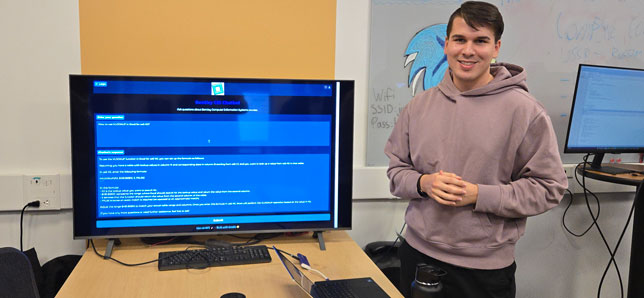ARTICLE AD BOX
Project-Based Learning in an AI-Inspired Era
Mark Frydenberg on enriching project-based learning with AI tools
- By Mary Grush
- 03/10/25
The return to project-based learning, paired with today's AI tools, has created a new learning paradigm. Here, Mark Frydenberg, distinguished lecturer of Computer Information Systems and director of the CIS Sandbox at Bentley University explores the sweet spot between project-based learning — a time-tested teaching and learning practice — and the latest in powerful AI tools.
 Anton Spiridonov, a senior at Bentley University majoring in Computer Information Systems, demonstrates his chatbot at a recent technology projects open house. (Photo courtesy Bentley University. With permission.)
Anton Spiridonov, a senior at Bentley University majoring in Computer Information Systems, demonstrates his chatbot at a recent technology projects open house. (Photo courtesy Bentley University. With permission.)
Mary Grush: Is there a resurgence of interest in project-based learning? If so, why are we seeing this now?
Mark Frydenberg: Many educators are turning to a project-based learning approach in their courses. Project-based learning puts students in the driver's seat, challenging them to tackle real-world problems and take ownership of their own learning. In doing so, they design and create their own projects and demonstrate that they have mastered course concepts. Project-based learning gives students a story to tell, rather than facts to recall.
Project-based learning gives students a story to tell, rather than facts to recall.Companies are looking to hire students who have knowledge about a particular subject domain that they studied in college, but they also demand that students have essential skills in communicating effectively, using technology to solve business problems, working in teams, and analyzing information carefully. Giving students opportunities to develop these skills prepares them for the workplaces they are about to enter.
In this era of AI, one of the biggest pitfalls of AI in education is over-reliance. It's tempting to copy and paste a problem description into a generative AI tool and ask it for a solution. While AI tools can help students consider different perspectives and are great for brainstorming, projects are generally more open ended and require students to think critically about multiple aspects of a complex problem.
Grush: Does AI have an effect on the design of project-based learning? Conversely, does project-based learning provide a richer environment for AI-supported programs?
Frydenberg: A challenge for educators today is to design assignments that are difficult for AI to complete fully. That's not always easy. We know that students are using AI tools. One approach to take, is to design projects for students that use AI not to obtain a solution, but as a tool to provide information that they can further analyze. We saw this in the AI hackathon we held shortly after ChatGPT was first released. Students used AI tools to generate trading strategies, and then visualized and refined them using financial analysis software. By adjusting their prompts, they were able to improve their financial models without needing coding expertise.
We also encourage students to use AI to help brainstorm, generating ideas. With AI tools such as Perplexity AI (perplexity.ai), performing a literature review that used to take hours can be done in seconds. That frees students to concentrate more on analyzing the information that AI gathers for them. The caveat, of course, is that while AI tools are getting better, they're not perfect. Students are responsible for checking the references or recommendations from AI to make sure they are valid and free of bias. Students also need the information literacy skills necessary to determine what other sources might not have been provided in an AI-based solution. AI allows students to use their time differently — instead of looking up information, they can verify it and begin to form their own connections between topics.
-

OpenAI Launches Its Largest AI Model Yet in Research Preview
OpenAI has announced the launch of GPT-4.5, its largest AI model to date, code-named Orion. The model, trained with more computing power and data than any previous OpenAI release, is available as a research preview to select users.
-

Microsoft Stepping Away from HoloLens Mixed Reality Hardware
Microsoft has confirmed that its HoloLens mixed reality hardware efforts have officially come to an end.
-

6 Policy Recommendations for Incorporating AI in the Classroom
The Southern Regional Education Board's Commission on AI in Education has published six recommendations for states on adopting artificial intelligence in schools, colleges, and universities. The guidance marks the commission's first release since it was established last February, with more recommendations planned in the coming year.
-

Report: Enterprises Embracing Agentic AI
According to research by SnapLogic, 50% of enterprises are already deploying AI agents, and another 32% plan to do so within the next 12 months..









 English (US) ·
English (US) ·